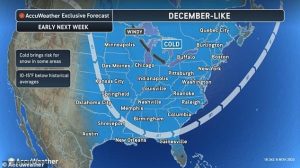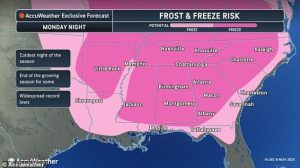Key Takeaways
- Over 100 million Americans face an Arctic blast starting this weekend.
- Temperatures will plunge 15-25 degrees below historical averages.
- The cold will stretch from the Plains to the East Coast, with the South experiencing freezing conditions.
- First significant snowfall of the season expected across northern regions.
- Travel disruptions, power strain, and unusual side effects like falling iguanas in Florida are anticipated.
A massive Arctic blast is set to sweep across the eastern United States, affecting over 100 million Americans with dangerously cold temperatures starting this weekend. Meteorologists warn this will be the most intense cold spell since last spring, with readings plunging 15 to 25 degrees below historical averages.
Widespread Frigid Conditions
The cold outbreak begins in the Plains and Mississippi Valley before reaching the East Coast by early next week. Major cities will see dramatic temperature drops: Atlanta will only reach the mid-40s on Monday, Chicago will experience 30s, and even New York City will struggle to get out of the 40s on Tuesday.
This December-like cold is being driven by a major dip in the jet stream, funneling unusually cold air far south. The northern Plains and Upper Midwest will feel the first wave starting Saturday, with Minneapolis temperatures falling sharply from the 40s to upper 30s.
Snowfall and Travel Impacts
Parts of the Midwest and eastern US could see their first snow of the season. The Weather Channel reports snow may develop from the Dakotas into southern Minnesota, Wisconsin, and Iowa over the weekend.
Lake-effect snowbands are expected over the Great Lakes snowbelts, potentially spreading into Chicagoland, Michigan, Indiana, Ohio, Pennsylvania, and western New York. While most areas will see light accumulations (around an inch), the Great Lakes snowbelts could receive several inches, creating slushy and slippery roads particularly affecting Monday and Tuesday commuters.
Southern Freezes and Unusual Effects
The cold will reach deep into the South, with Monday morning bringing freezing temperatures as far south as Texas and stretching to the Appalachian Mountains. Southwest Florida will experience rare cold, with Naples facing record-like temperatures and winds exceeding 30 mph.
An unusual side effect: when temperatures dip below 50 degrees in Florida, local iguanas may stiffen and fall from trees. This phenomenon could become more widespread during this Arctic blast.
Safety Concerns and Duration
Meteorologists caution that the extended frigid conditions could cause frozen pipes, power strain, and significant travel disruptions. The cold air arrives via an Alberta Clipper storm system from southwestern Canada, known for bringing quick bursts of cold air, snow, and gusty winds.
The Arctic air will continue marching eastward, reaching the Southeast and Mid-Atlantic by early next week. Experts urge residents to bundle up, protect vulnerable plants and animals, and prepare for potential disruptions throughout the affected regions.










